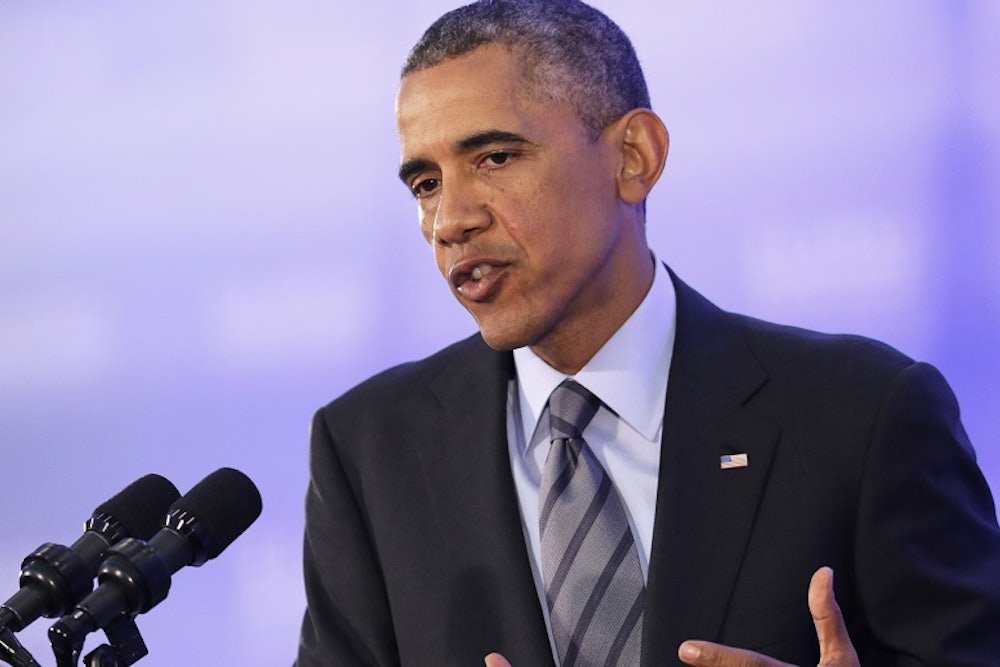President Obama has repeatedly said that if Congress won’t act on certain issues, then he would do so unilaterally—within the laws of the Constitution, of course. As he said in January, “I’ve got a pen and I’ve got a phone.”
So far, he has backed up those words. Obama has already announced one executive order that increases the minimum wage for workers under federal contracts and another that prohibits federal contractors from discriminating based on sexual orientation. In March, the president directed the Labor Department to revamp overtime rules. And his most controversial executive order is yet to come: In the fall, Obama is expected to announce that he will grant deferred status to possibly as many as five million undocumented immigrants.
On Wednesday, the president revealed yet another area where the administration is looking to act unilaterally: tax inversions. American companies use tax inversions to lower their tax bills by officially changing their tax jurisdiction to somewhere with a lower rate. They do so by merging with a foreign firm, but none of their operations change. Their management and control remain in the United States and Americans still make up the majority of their shareholders. All these companies have done is avoid U.S. taxes.
In 2014, many U.S. companies, particularly those in the pharmaceutical industry, have used an inversion to reduce their tax bills. This has set off a flurry of activity within the Democratic Party to stop this strategy. Treasury Secretary Jack Lew has called the practice unpatriotic. In fact, even some Senate Republicans, who have long argued that tax inversions should be addressed in comprehensive tax reform, have hinted at a willingness to pass a short-term fix. But in the GOP-controlled House there is little appetite for any such legislation, so Obama has decided to examine if he can deter these deals without Congressional help.
“We don’t want to see this trend grow,” Obama said at a news conference Wednesday. “We don’t want companies that up until now were playing by the rules looking over their shoulder at some competitor gaming the system … We want to move quickly—as quickly as possible.”
It’s not clear exactly what he can do. One possibility would be to ban federal contracts for companies that use such a strategy. Another, proposed by former Treasury official Stephen E. Shay in Tax Analysts, would direct the Treasury Department to reduce certain incentives that companies have to use an inversion. (For the full details on that, read Shay’s proposal.)
Of course, less than a month ago, the administration was saying it had little power to use executive authority to stop this practice. “We do not believe we have the authority to address this inversion question through administrative action,” Secretary Lew said.
This has become a theme of Obama’s presidency: Say you can’t take unilateral action and then do just that when Congress fails to act. Back in 2011, Obama argued that he couldn’t grant deferred status to a large class of undocumented immigrants without Congressional approval. Three years later, he reportedly will do exactly that. The same thing looks to be happening with tax inversions.
—Danny Vinik
Things to know:
CAPITAL PUNISHMENT: Missouri carried out its seventh execution of the year on Wednesday. That ties it with Florida and Texas for the dubious distinction of most executions this year. (Time)
INFRASTRUCTURE: President Obama’s vow to create new, high-speed rail networks all over the nation sounded great. Eleven billion dollars later, there’s not much to show for it. (Ron Nixon, New York Times)
IMMIGRATION: Vice President Joe Biden said Wednesday that the unaccompanied migrant children who have crossed the U.S. border deserve lawyers. As Rebecca Leber has argued, this is a no-brainer. (Justin Sink, The Hill)
Things to read:
What are the limits of Obama’s leeway on immigration? Greg Sargent puts that question to a former general counsel at the Department of Homeland Security. (The Plum Line)
Wireless emergency: Cellphone carriers are fighting a federal proposal that would force them to install better technology in their equipment, so that emergency responders could pinpoint the source of calls. (Dana Liebelson, Mother Jones)
You know it’s true when: Even Heritage Foundation is telling conservatives to take the fear mongering down a few notches, reminding Republicans that, no, migrant children aren't going to carry Ebola into the U.S.
A non-existent problem: A law expert examines the cases of actual, credible voter fraud in the last 14 years. He found only 31, out of more than 1 billion ballots. (Justin Levitt, Wonkblog)
Uh oh: An MIT study is one of the first to look at how the world can get to an agreement in 2015 to keep global warming below 2 degrees Celsius. The researchers find it can't. (Jeff Spross, ThinkProgress; Henry Jacoby, MIT)
Things to watch:
Hawaii will be hit by back-to-back hurricanes starting Thursday—which is pretty rare for the archipelago. Hawaii hosts its Senate primary election on Saturday.
Things at QED:
Danny Vinik presents a map of the countries where U.S. asylum recipients come from. If you think Central America, you’re way off.
